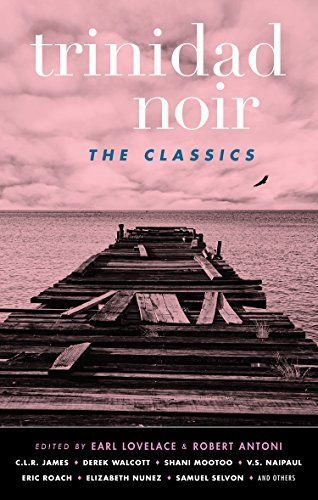
Trinidad noir the classics
"To travel through the 19 works of poetry and prose in this remarkable anthology is to experience Trinidad and Tobago through a kaleidoscopic lens. The writings are grouped into four historically significant periods (''Leaving Colonialism,'' ''Facing Independence,'' ''Looking In,'' and ''Losing Control''). It's an effective construct; the reader experiences island culture and history as a part of its time, formed by a pastiche of nationality, culture, and social class. Standouts abound." -- Publishers Weekly , Starred review "Pairing nicely with 2008''s Trinidad Noir , this retrospective collection features classic stories from writers who were part of the literary wave that crested with Trinidadian independence in 1962. Notable authors include Derek Walcott, V.S. Naipaul, Elizabeth Nunez, Shani Mootoo, and the volume's editors. Holds strong appeal for fans of noir and literary writing." -- Library Journal "Lovelace and Antoni offer a ''subversive'' take on island culture to complement the 21st-century look at Trinidad offered by Lisa Allen-Agostini and Jeanne Mason's Trinidad Noir ...Whether history repeats itself or progress is stalled by people's infinite capacity to get in their own ways, these 19 reprinted tales offer a bittersweet perspective on the cussedness of human nature." -- Kirkus Reviews "An expansive retrospect of some of the best literature to emerge from Trinidad in the last century...Perhaps most importantly, this collection lays a solid foundation that establishes a glimmering hope for Trinidad's literary future. With all its stunning history, variation, synchronicity and vibrant focus on humanity, Trinidad Noir: The Classics makes it clear that Trinidadian literature must be more globally examined and elevated." -- Black Book Quotes Akashic Books continues its award-winning series of original noir anthologies, launched in 2004 with Brooklyn Noir . Each book comprises all new stories, each one set in a distinct neighborhood or location within the geographic area of the book. Now, two of Trinidad's top writers masterfully curate this literary retrospective of the nation's best writing over the past century. Reprints of classic stories (and poems) by: C.L.R. James, Derek Walcott, Samuel Selvon, Eric Roach, V.S. Naipaul, Harold Sonny Ladoo, Michael Anthony, Willi Chen, Earl Lovelace, Robert Antoni, Elizabeth Nunez, Ismith Khan, Lawrence Scott, Wayne Brown, Jennifer Rahim, Elizabeth Walcott-Hackshaw, Sharon Millar, Barbara Jenkins, and Shani Mootoo. From the introduction by Earl Lovelace: Where Trinidad is different even from its Caribbean sisters is the degree to which it has developed its folk arts--its carnival, its steel band, its music--as forms of both rebellion and mediation. These forms have not only continued to entertain us; they ritualize rebellion, speak out against oppression, and affirm the personhood of the downpressed. This rebellion is not evident with the same intensity as it used to be. Independence and political partisanship and the growing distance of the middle class from the folk, among other developments, have seen a fluctuation in the ideals of rebellion. Yet what is incontestable is that these arts have established and maintained a safe space for conflict to be resolved or at least expressed, not in a vacuum but in the face of a status quo utilizing its muscle and myths to maintain a narrative that upholds its interests. As the situation becomes more complex and information more crucial, our literature is best placed to challenge or to consolidate these myths. Individually, we are left to decide on whose behalf our writing will be employed. In this situation, the struggle has been within the arts themselves--whether they see themselves as an extension of rebellion or art as entertainment. Although late on the scene and without the widespread appeal of the native and folk arts, our literature can lay claim to being part of these arts of rebellion, upholding and making visible the dismissed and ignored, lifting the marginalized into personhood, persuading us that a new world is required, and establishing this island as a place in which it can be imagined and created.